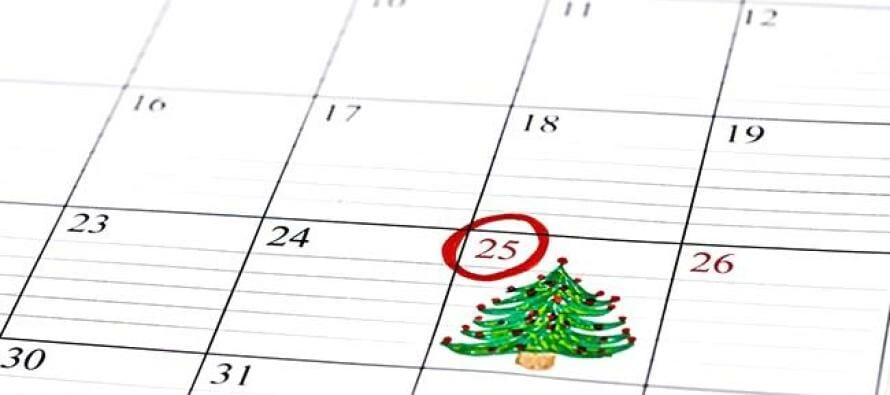Why is Christmas Day on the 25th of December?

Why is Christmas Day on the 25th of December?
Christmas is celebrated to remember the birth of of Jesus Christ, who Christians believe is the Son of God.
The name ‘Christmas’ comes from the Mass of Christ (or Jesus). A Mass service (which is sometimes called Communion or Eucharist) is where Christians remember that Jesus died for us and then came back to life. The ‘Christ-Mass’ service was the only one that was allowed to take place after sunset (and before sunrise the next day), so people had it at Midnight! So we get the name Christ-Mass, shortened to Christmas.
Christmas is now celebrated by people around the world, whether they are Christians or not. It’s a time when family and friends come together and remember the good things they have. People, and especially children, also like Christmas as it’s a time when you give and receive presents!
The Date of Christmas
No one knows the real birthday of Jesus! No date is given in the Bible, so why do we celebrate it on the 25th December? The early Christians certainly had many arguments as to when it should be celebrated! Also, the birth of Jesus probably didn’t happen in the year 1AD but slightly earlier, somewhere between 2BC and 7BC (there isn’t a 0AD – the years go from 1BC to 1AD!).
The first recorded date of Christmas being celebrated on December 25th was in 336AD, during the time of the Roman Emperor Constantine (he was the first Christian Roman Emperor). A few years later, Pope Julius I officially declared that the birth of Jesus would be celebrated on the 25th December.
There are many different traditions and theories as to why Christmas is celebrated on December 25th. A very early Christian tradition said that the day when Mary was told that she would have a very special baby, Jesus (called the Annunciation) was on March 25th – and it’s still celebrated today on the 25th March. Nine months after the 25th March is the 25th December! March 25th was also the day some early Christians thought the world had been made, and also the day that Jesus died on when he was an adult.
December 25th might have also been chosen because the Winter Solstice and the ancient pagan Roman midwinter festivals called ‘Saturnalia’ and ‘Dies Natalis Solis Invicti’ took place in December around this date – so it was a time when people already celebrated things.
The Winter Solstice is the day where there is the shortest time between the sun rising and the sun setting. It happens on December 21st or 22nd. To pagans this meant that the winter was over and spring was coming and they had a festival to celebrate it and worshipped the sun for winning over the darkness of winter. In Scandinavia, and some other parts of northern Europe, the Winter Solstice is known as Yule and is where we get Yule Logs from. In Eastern europe the mid-winter festival is called Koleda.
The Roman Festival of Saturnalia took place between December 17th and 23rd and honoured the Roman god Saturn. Dies Natalis Solis Invicti means ‘birthday of the unconquered sun’ and was held on December 25th (when the Romans thought the Winter Solstice took place) and was the ‘birthday’ of the Pagan Sun god Mithra. In the pagan religion of Mithraism, the holy day was Sunday and is where get that word from!
Early Christians might have given this festival a new meaning – to celebrate the birth of the Son of God ‘the unconquered Son’! (In the Bible a prophesy about the Jewish savior, who Christians believe is Jesus, is called ‘Sun of Righteousness’.)
The Jewish festival of Lights, Hanukkah starts on the 25th of Kislev (the month in the Jewish calendar that occurs at about the same time as December). Hanukkah celebrates when the Jewish people were able to re-dedicate and worship in their Temple, in Jerusalem, again following many years of not being allowed to practice their religion.
Jesus was a Jew, so this could be another reason that helped the early Church choose December the 25th for the date of Christmas!
Christmas had also been celebrated by the early Church on January 6th, when they also celebrated the Epiphany (which means the revelation that Jesus was God’s son) and the Baptism of Jesus. Now Epiphany mainly celebrates the visit of the Wise Men to the baby Jesus, but back then it celebrated both things! Jesus’s Baptism was originally seen as more important than his birth, as this was when he started his ministry. But soon people wanted a separate day to celebrate his birth.
Most of the world uses the ‘Gregorian Calendar’ implemented by Pope Gregory XIII in 1582. Before that the ‘Roman’ or Julian Calendar was used (named after Julius Caesar). The Gregorian calendar is more accurate that the Roman calendar which had too many days in a year! When the switch was made 10 days were lost, so that the day that followed the 4th October 1582 was 15th October 1582. In the UK the change of calendars was made in 1752. The day after 2nd September 1752 was 14th September 1752.
Many Orthodox and Coptic Churches still use the Julian Calendar and so celebrate Christmas on the 7th January (which is when December 25th would have been on the Julian calendar). And the Armenian Apostolic Church celebrates it on the 6th January! In some part of the UK, January 6th is still called ‘Old Christmas’ as this would have been the day that Christmas would have celebrated on, if the calendar hadn’t been changed. Some people didn’t want to use the new calendar as they thought it ‘cheated’ them out of 11 days!
St Augustine was the person who really started Christmas in the UK by introducing Christianity in the 6th century. He came from countries that used the Roman Calendar, so western countries celebrate Christmas on the 25th December. Then people from Britain and Western Europe took Christmas on the 25th December all over the world!
Related Articles
Mother’s Day Humor & Things We’ve Learned from our Children
Mother’s Day Humor & Things We’ve Learned from our Children If you spray hair spray on dust bunnies
Coachella Valley’s Christmas Store
Coachella Valley’s Christmas Store Our Story: Since 2004, the Coachella Valley Christmas Store has been serving families who do not
Coachella Valley Halloween Safety Tips
Coachella Valley’s Riverside County Sheriff’s Halloween Safety Tips CoachellaValley.com would like for everyone to have a safe




